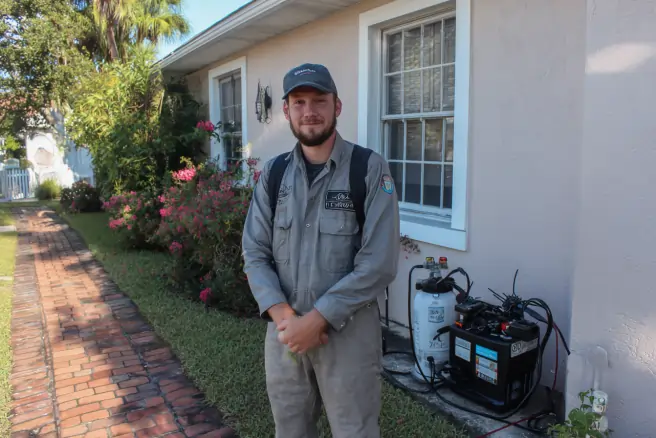
Deltona, Florida, is the largest city in Volusia County, tucked between Orlando and Daytona Beach. It’s a place where families enjoy the slower pace of suburban living while still being close to the excitement of Central Florida. With more than 30 lakes, conservation lands, and tree-lined neighborhoods, Deltona offers plenty of natural beauty.
But with that beauty comes an inevitable challenge: pests.
From mosquitoes buzzing over lakeshores to termites gnawing away at wood, Deltona’s environment creates year-round pest problems for homeowners. Effective pest control here isn’t just about convenience — it’s about protecting homes, health, and the natural balance of the community.
Why Deltona’s Environment Attracts Pests
Deltona’s geography and climate combine to create ideal conditions for unwanted critters:
-
Abundant water sources: Lakes, ponds, and wetlands provide endless breeding grounds for mosquitoes.
-
Wooded surroundings: Ants, termites, and rodents thrive in forested areas that border many neighborhoods.
-
Year-round warmth: Unlike northern climates, Florida pests never hibernate.
-
High humidity: Moisture fuels mold, mildew, and pests like cockroaches that prefer damp environments.
-
Seasonal storms: Afternoon downpours and hurricanes disrupt soil, flood yards, and drive pests indoors.
For Deltona residents, pest control is less about “if” and more about “when.”
Common Pests in Deltona Homes
Termites
One of the biggest threats in Central Florida, termites quietly cause thousands of dollars in damage before homeowners even notice. Subterranean termites tunnel up from the soil, while drywood termites infest attics and furniture.
Mosquitoes
With so many lakes and retention ponds, mosquitoes are more than a nuisance — they carry risks like West Nile virus and dengue. Summer evenings outdoors often become unbearable without proper control.
Ants
Carpenter ants tunnel through wood, while fire ants invade lawns and deliver painful stings. Indoors, sugar ants find their way to kitchens with ease.
Cockroaches
American cockroaches (palmetto bugs) thrive in garages and basements, while German cockroaches prefer kitchens. Both contaminate food and spread allergens.
Rodents
Roof rats and mice seek shelter in attics and garages, especially after heavy rains. They chew wires, create fire hazards, and spread disease.
Wildlife
Deltona’s wooded edges mean raccoons, squirrels, and even snakes occasionally wander into yards, sheds, or under porches.
The Health Risks of Pests
Pest problems in Deltona aren’t just inconvenient. They carry serious health risks:
-
Rodents: Spread salmonella and hantavirus.
-
Cockroaches: Trigger asthma, especially in children.
-
Mosquitoes: Transmit viruses like West Nile, Zika, and dengue.
-
Ants: Fire ants cause painful stings and allergic reactions.
For families and seniors living in Deltona, protecting health is a major reason to invest in professional pest control.
How Pest Control Works in Deltona
Professional pest management here requires strategies tailored to the city’s lakeside and wooded environment.
Step 1: Inspection
Technicians assess the property, identifying problem areas like standing water, cracks in the foundation, or rodent entry points.
Step 2: Customized Treatment
-
Mosquitoes: Larvicides in standing water, yard fogging, and drainage improvements.
-
Termites: Bait stations, soil treatments, or wood injections depending on the infestation.
-
Ants: Bait systems and perimeter treatments to collapse colonies.
-
Rodents: Sealing entry points and setting traps.
-
Cockroaches: Baits and targeted treatments in kitchens, bathrooms, and basements.
Step 3: Prevention
Ongoing treatments establish barriers around the home. Education helps homeowners eliminate conditions pests love, like clogged gutters or uncovered trash.
Step 4: Monitoring
Quarterly or monthly visits ensure pests don’t return, especially in neighborhoods with lakes or wooded backdrops.
The Cost of Pest Control in Deltona
Prices vary by pest type and home size, but averages include:
-
General pest control (ants, roaches, spiders): $40–$75/month.
-
Mosquito control: $50–$100 per treatment.
-
Termite treatment: $800–$3,500 depending on severity.
-
Rodent exclusion: $200–$600.
Compared to the cost of termite damage or rodent infestations, these services are a wise investment for homeowners.
Prevention Tips for Deltona Residents
Homeowners can reduce pest risks by adopting a few habits:
-
Eliminate standing water around yards to cut down on mosquitoes.
-
Trim trees and shrubs that touch the house, reducing rodent and ant access.
-
Seal cracks in foundations, doors, and windows.
-
Keep gutters clean to avoid standing water.
-
Store firewood away from the house to discourage termites.
-
Inspect attics and basements regularly for droppings or water damage.
These simple steps, paired with professional treatments, provide the strongest defense.
Why Local Expertise Matters
Deltona’s unique mix of lakes, wetlands, and wooded neighborhoods makes pest control different here than in coastal or urban Florida. Local pest professionals understand:
-
The seasonal termite swarms specific to Central Florida.
-
The mosquito challenges around retention ponds and conservation areas.
-
Wildlife patterns tied to wooded areas.
-
How storms shift pest behavior, driving infestations indoors.
This insight allows local companies to create targeted, effective strategies for Deltona residents.
Final Thoughts
Deltona is a city shaped by water and woods, offering residents a peaceful lifestyle close to nature. But with that comes a steady stream of pests — termites in the soil, mosquitoes in the air, and rodents in the attic.
For homeowners here, pest control isn’t just a seasonal concern. It’s a year-round responsibility tied to the very environment that makes Deltona special.
With professional help, preventive strategies, and regular monitoring, residents can enjoy lake views, shaded backyards, and community parks without worrying about what’s crawling or flying nearby.
Because in Deltona, the only creatures that should feel welcome in your home are your family and friends — not pests.